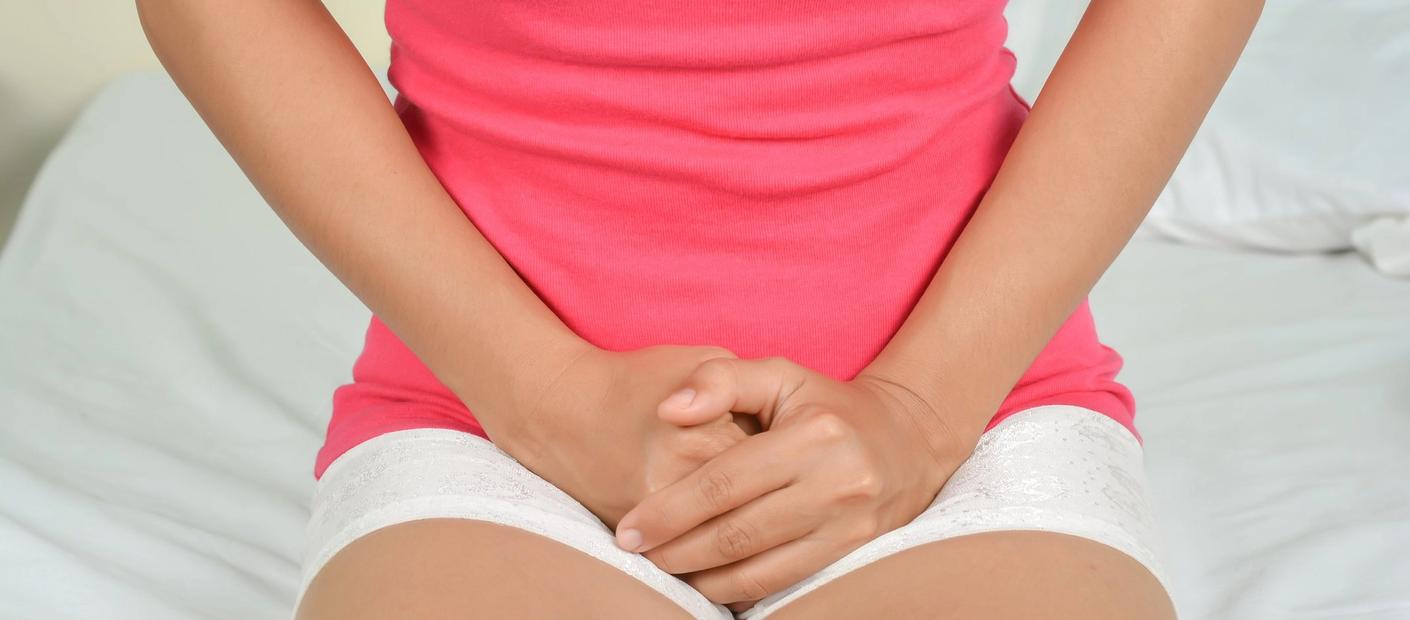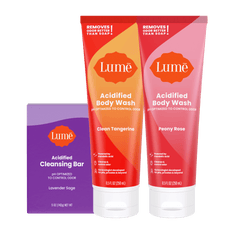
11 Things That Contribute To “Feminine Odor”
by Shannon Klingman, M.D.
Here at Lume, we are changing the narrative on feminine hygiene.
The truth is, the vagina is not to blame for odor the majority of the time, and it just happens as a result of living a full life. Workouts, intimacy, periods, skipped showers, and leaky bladders can all lead to odor.
Men have odor, too.
So, why is it that women spend more time concerned about odor than men, when odor happens to all of us?
Here’s my theory… Ready for this?
Men do not have the pleasure of putting their feet in the stirrups, letting their knees fall to the side with a speculum placed into a body cavity every year. All this just inches away from the face of a doctor.
I guarantee you, if men had to do this, they would have had this problem solved in two shakes about 100 years ago.
It took a woman to solve body odor!
Lume Deodorant For Pits, Privates & Beyond is very effective at preventing body odor in intimate areas (for both women AND men!).
However, you may be wondering what causes so called “feminine odor” in the first place.
Here are 11 things that contribute to odor:
1. Long pubic hair
Hair increases the surface area for bacteria and bodily fluids to linger and lead to odor. Think of it as a dance floor. The smaller the dance floor, the smaller the area the bacteria and bodily fluids have to hang out and interact with each other. Pubic hair holds on to residual urine, vaginal discharge, blood and semen. Bacteria line up all along the hair shaft just lunching it up and creating odor. (Very appetizing, I know.)
Trimming your pubic hair reduces that surface area for bacteria, thus reducing odor.
2. Menstrual Blood
It’s actually not the vagina that tends to cause odor, it’s bacteria from our backside. So, using a diva cup or tampon helps to keep menstrual blood from coming into contact with bacteria commonly found in our gastrointestinal tract. Bacteria digest the proteins and fats found in blood and release odor. By keeping blood away from between our butt cheeks and vulva, we are reducing the potential for odor to form.
3. Urine
When you empty your bladder, residual urine happens. If you leak urine when you cough, sneeze or laugh, you have a little more than most. Bacteria digest it and that creates odor. If you want to use a spray bottle or a wet wipe and just good old toilet paper to pat dry, you will minimize this odor reaction from happening.
4. Intimacy
Semen is the worst offender for odor between our legs. Bacteria commonly found in our gastrointestinal tract digest it slowly over time, and the vagina serves as a reservoir for it to leak out for the next couple of days. You can use a tampon after intercourse to minimize the leakage. Just remove it a few hours later.
These odors are indistinguishable from odors commonly noted with bacterial vaginosis. This means that if you notice a strong odor “down there,” you can try using Lume. If it’s an external odor that doesn’t require antibiotics, the odor will go away within 3-4 days. If odor persists, you may have an infection, so you’ll want to see your doctor.
5. Tight-fitting clothes
If you are wearing clothing that is squeezing your butt cheeks together, odor is just brewing away. Think Ziploc bag. That’s exactly what’s happening with your jeans, yoga pants, and tights.
6. Number Poo residue
It happens. Especially in public bathrooms with cheap toilet paper. Or at a cheap friend’s house who uses cheap toilet paper.
You can imagine how even a little bit of residue won’t leave you smelling fresh and clean after you leave the bathroom.
I recommend using toilet paper and freshening up with a Lume Deodorant Wipe until it swipes white. (No ordinary wipe, our wipes are clinically proven to control odor for 24 hours!)
7. Man-made fabrics
If your clothing contains anything other than cotton or wool, it has man-made fibers.
These have been shown to promote the B.O. reaction.
Sweat and bacteria find their way to the fabrics every time you wear them, and you cannot keep this B.O. reaction from happening, no matter what product you use.
Next time you think your deodorant failed you, make sure you are not just smelling that reaction in the shirt from a previous wear.
Pre-hamper your fabrics with an enzyme pretreat spray
to help get those odors out.
8. Thong underwear
As a gynecologist, I always referred to this as butt floss. It is meant to be worn only briefly, in my opinion. Think of it like a rope on a pulley moving back and forth shifting bacteria from your backside to the front side. Thongs increase your risk of irritation and yeast infections.
9. Vaginal discharge
What happens is, when it is digested by bacteria commonly found in our gastrointestinal tracts (get the reoccurring theme here?), a mild fishy odor is released.
There is nothing wrong with you, it just happens.
Higher pH discharge is more likely to happen during ovulation, pregnancy and in post-menopausal years.
10. Retained tampon
Have you ever smelled a rotten potato?
This is even worse.
Most retained tampons are left in at the end of your period, and you forget about them. It is also possible to double up on tampons in the vagina and not realize it.
About three days later (or more) you will begin to notice the smell of death.
We should be changing our tampons every 4-6 hours during the day and not leaving one in overnight for longer than 8 hours.
11. Vaginal infections
Bacterial vaginosis (BV) and trichomoniasis both have a fishy foul odor associated with them.
BV is milder in odor and odor may be the only symptom you have.
Trichomoniasis is almost always associated with a change in vaginal discharge that is grey or greenish in nature. If you notice a strong fishy odor immediately after intercourse, chances are you have this. It is a parasite and needs antibiotics to treat it.
You can minimize those odors by trying some of the suggestions I have mentioned.
If you are looking for a life-changing, uninhibited “go with the flow even if you have skipped a shower or two” kind of confidence, try Lume Deodorant.
It will leave you pleasantly surprised by how effective it is and how little you may need to apply. After all, it's clinically proven to control odor for up to 72 hours!
For added protection alongside Lume Deodorant, use Lume Deodorant Wipes anywhere you have odor but wish you didn't.
If you still notice odor despite using Lume for a few days, you need to see your doctor to rule out a more concerning issue.
Recent Articles
- Your New Indulgence: Introducing Vanilla Bliss
April 04, 2025
- Feminine Hygiene Myths: A Tale As Old As Time
March 24, 2025
- Do Showers Control Body Odor?
March 18, 2025
- The Skin Loving Benefits of Mandelic Acid
February 28, 2025
- Why Is Acid In My Deodorant?
February 28, 2025
- What Are AHAs?
February 28, 2025
- 3 Helpful Tips For Getting Started
February 28, 2025
- Unlocking Smoother Looking Skin: Lume's Guide to Managing KP
January 29, 2025
- Drier Days Are In Your Pits’ Future!
January 15, 2025
- This Spray Slays
January 10, 2025
















